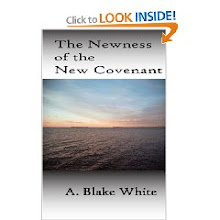Reason #7: Jesus is clear that eating His flesh and drinking His blood results in something “spiritual”, namely “eternal life” (6:54, 57). If the result is “spiritual”, then the cause (eating and drinking) must be “spiritual” as well (i.e. faith). In other words, it is not physical eating and drinking in view, but appropriation of Christ through personal faith (which is a spiritual act) in Him. This fits with the rest of Scripture, which affirms that eternal life only comes by faith.
Reason #8: It is likely that if Jesus were speaking about the Lord’s Supper that He would use the Greek word soma (translated “body”). Every passage in Scripture referring to the Lord’s Supper uses this word to speak of the body of Christ as represented in the bread (Matt. 26:26; Mk. 14:22; Lk. 22:19; I Cor. 10:16; 11:24, 27). Instead, Jesus uses the Greek word sarx (translated “flesh”).
Reason #9: At first, Christ simply speaks of “eating” His flesh (6:51). Later he refers to “eating His flesh and drinking His blood” (6:53-55). Finally, he refers only to “eating His flesh” (6:57). Again, this seems to prove Christ is speaking metaphorically. One must assume that if He was speaking about the Lord’s Supper that He would always include the act of “drinking” with the that of “eating”. He does not do that. As shown above (verse 57), Christ simply speaks of “eating” to the exclusion of “drinking”. If He were speaking about the Lord’s Supper, then it would appear Christ is diminishing in some sense the “drinking” aspect. Thus, the eating and drinking are not referring to the Lord’s Supper. Rather to “eat His flesh and drink His blood” is the same thing as believing (vss. 35, 47); coming (vs. 35), listening (vs. 45), and learning (vs. 45). Coming to Christ in faith seems to be more logically consistent.
Reason #10: Jesus is addressing largely unbelievers (“the Jews”…In John’s Gospel this title always refers negatively to the Jewish religious leaders who reject Christ.), not believers. It is true, that many were lukewarm disciples, but we see at the end of the chapter that they were not true believers because they deserted Jesus. Therefore, it would not make sense to command observance of Lord’s Supper (when Christ has not yet died anyway) to an audience largely composed of unbelieving, sinful rejecters of Christ.
Reason #11: Jesus says that eternal life is granted to those who eat and drink Christ. Christ unequivocally says there is “no life” (6:53) in those who do not. If this were as some suggest a reference to the Lord’s Supper, then it would logically result in a belief in works salvation. In other words, if one asserts the Lord’s Supper is in view in Christ words, then he must also assert that the act of observing the Lord’s Supper grants eternal life. This is contrary to grace and promotes works oriented salvation. Ironically enough, that is what the religious leaders, influenced by the Pharisees, held to. Jesus certainly did not promote their erroneous teaching! In fact, He rebuked them in 6:29, declaring that one does not work for salvation. Rather, one simply believes.
Reason #12: The eating and drinking in John 6 is reference to salvation. Whereas, the eating and drinking that is seen in Lord’s Supper is for those who have already been saved looking back with thanksgiving.
Reason #13: (This last one is for all the Greek snobs.) The verbs “eat” and “drink” (ex. 6:50, 53) are in the Aorist tense (original Greek) emphasizing the once for all action of receiving Christ. Observance of the Lord’s Supper is an ongoing recognized ordinance of the church. Thus, it cannot be in view based on the basic grammar of the text itself.
Wednesday, May 27, 2009
Subscribe to:
Post Comments (Atom)








1 more and you could top Noah's 13 points! :)
ReplyDeleteAll joking aside, that was great. I think you have laid out clearly that Jesus was speaking in spiritual terms and not physical. Can we see the Lord's supper in this passage in any way? Not the focus, agreed! Would this passage have entered the minds of the disciples in the upper room? Clearly when we take communion, we have to glory not in the elements themselves, but what they represent. With this understanding, can we glean an ongoing rememberance of Christ's work in the John 6 passage?
As R.C. Sproul would say, “Now that’s a good question?” Unfortunately, however, I am not Sproul, so let me try to confuse you more….
ReplyDeleteIt is clear that Jesus' words are directed to His death on the cross. For His death on the cross as the sinner's substitute is the only reason that He qualifies in being the "bread" that satisfies our hungry souls. In the same vein, it was His death on the cross that qualified Him to be the drink that quenches man's deepest thirst. Jesus said in verse 51, "the bread also which I will give for the life of the world is my flesh". This statement appears to be an allusion to His crucifixion. Perhaps it is a veiled allusion, for His immediate audience might not have understood this as referring to His death. Nevertheless, it appears that Christ's own intention is, in fact, to indicate His death. Such a statement must be speaking about His death because it asserts the "giving" of His flesh (i.e. His body). What better way to give yourself than by offering yourself as a dying substitute in the place of others? In short, I think we can affirm that the bread mentioned in John 6 symbolizes His body that would be lifted up and crucified. Also, I think we can affirm the drink mentioned in John 6 as symbolic of His shed blood. However, that is as far as we can go. As Jesus gave these words His crucifixion was in view, not the Lord's Supper. Observing the Lord's Supper would mean nothing until His death was understood. I believe the Lord's Supper, as an institution was the furthest thing from Christ's mind as He gave His discourse in John 6. In addition, the Apostle John nowhere indicates that that was his intention (under the inspiration of the Spirit of course) for recording this discourse. Therefore, the central thrust of the passage seems to focus on Christ's death as a substitute, not the Lord's Supper as an ordinance. For the Supper means nothing without His death. We can certainly glean an ongoing remembrance of Christ’s work on the cross from this passage because now we can fit everything together much better than Christ’s original audience. On the other hand, the Lord’s Supper was not the point of Christ’ discourse. Thus, we would be wrong to support the Lord’s Supper as an ordinance from this passage. We would be better to go to Matthew, Luke, and Corinthians for that.
Great question, Tim!
Just out of curiosity, is it the Roman Catholic church that would claim they are litterally eating Christ's body and drinking His blood during communion? Or is that a different denomination? And I'm assuming that this particular passage would be the one they would use to defend that stance - ?
ReplyDeleteLaura,
ReplyDeleteYou are correct on both fronts! You must be a pk (ha ha). I used the term "Sacramentalist", but that certainly includes the Roman Catholic Church.
Alright, now for my next question...WHY would the Roman Catholic church feel they need to litterally eat and drink of Christ's body?
ReplyDeleteLaura,
ReplyDeleteI am sorry that I have taken so long to get back to you. I have struggled with how to answer your question in a manner that is, well...short (not long winded). I have opted to point you to Sam Storms teaching on the "sacramentalism" of the Roman Catholic Church. His comments are brief, yet accurate and understandable. I am sure you will be like me and have many more questions regarding the RCC's reasoning. However, this should give you a good start. Just click on the links below to view Storm's comments. His teaching on sacramentalism comes in three parts. The first part is the most important because it answers your question directly. However, I would encourage you to read as much as you can, especially the section on "the Eucharist" (part 2). In this section Storms describes what happens in the mass according to RCC teaching. Let me know if you have any more questions....
Part 1- http://www.enjoyinggodministries.com/article/sacramentalism-part-i/
Part 2- http://www.enjoyinggodministries.com/article/sacramentalism-part-i/
Part 3- http://www.enjoyinggodministries.com/article/sacramentalism-part-iii/
Okay, for some reason you cannot click on the links I posted to get to Storms teaching. Therefore, I will post them on the main blog page as the next post. Sorry.
ReplyDelete